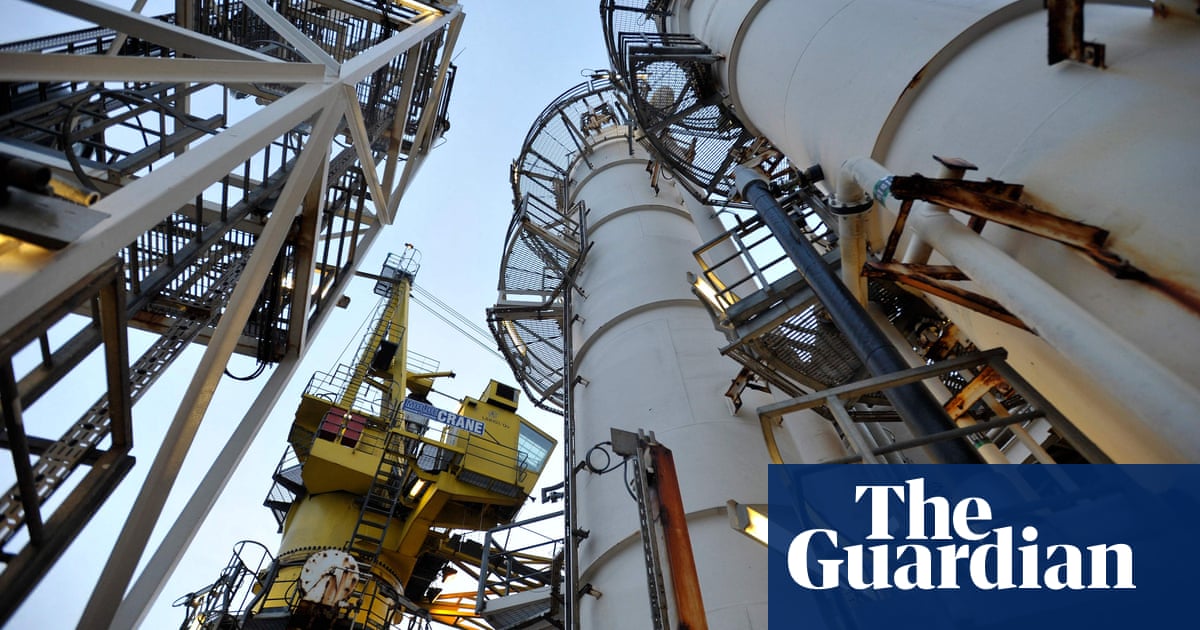
Individuals and companies linked to the oil and gas industries have donated more than £400,000 to the Conservative party in the past year, while the government mulled controversial new licences to explore the North Sea for fossil fuel production sites, it can be revealed.
Disclosures from last July to the end of March, the latest date for which data is available, show at least £419,000 was given to the Conservatives by donors with a strong interest in oil and gas, including in the North Sea, research by the environmental investigations group DeSmog and the Guardian has found.
The donations include: a total of £25,000 from Amjad Bseisu, the chief executive of EnQuest, an oil and gas company with strong interests in the North Sea, who has given more than £400,000 to the party since 2013; £200,000 from Balmoral Group Holdings, an oil and gas technology and services specialist; £155,000 from Alasdair Locke, the non-executive chairman of Well-Safe Solutions, which decommissions oil and gas sites; nearly £20,000 from Richard Upshall, the founder of OES Asset Integrity Management; and £25,000 from Centrax, a gas turbine company.
The donations came as the government deliberated the future development of the UK’s lucrative oil and gas fields in the North Sea. A review was formally opened last September and then on 24 March came the announcement of a new round of licensing for oil and gas wells, with up to £16bn in joint investment between the government and private sector, despite the likely negative impact of such development on the UK’s climate targets.
The UK is to host a vital UN summit, Cop26, in Glasgow this November, at which all countries will be asked to come up with stringent targets on cutting greenhouse gas emissions in the next decade, and to make an urgent transition away from fossil fuels to renewable energy and low-carbon economies. Cop26 is widely regarded as one of the last chances to put the world on track to meet the 2015 Paris climate agreement, in a “make-or-break” decade for the climate.
The decision by ministers to pursue a new round of North Sea licences caused serious concern among senior figures in the climate talks. Other countries, including Denmark and France, are halting investment in new fossil fuel production.
The decision also came just ahead of the publication of analysis commissioned by the UK, as part of its Cop26 role, from the International Energy Agency that showed all new development of fossil fuels must cease after this year if the world is to limit global heating to 1.5C, in line with scientific advice.
The Guardian understands that the companies making donations, or whose senior personnel were listed as donors, made no direct representations to the government over the award of oil and gas licences, and that ministers have held no meetings with the companies in the past year.
Locke told the Guardian that Well-Safe Solutions, as an expert in decommissioning old sites, was involved in the clean-up of the North Sea industry rather than its expansion. He added his donations were to the Scottish Conservative party, which he backed in the hope of preserving the union.
“We are not doing exploring, we are part of the energy transition,” he said. “I am very keen that Scotland remains part of the UK, I do not think it would be good for Scotland not to be part of the UK, and the Scottish Conservative party are the strongest unionist party.”
A spokesperson for Balmoral Group said most of its work was overseas: “[About] 90% of our products are exported to deepwater fields around the world – South America, west Africa, far east etc [with] minimal business done in the North Sea.”
The other companies and the Conservative party did not respond to requests for comment.
The government has said the oil and gas licences should only be awarded if they “are aligned with the government’s broad climate change ambitions, including the UK’s target of reaching net zero [carbon emissions] by 2050”. A “checkpoint” of criteria that will determine whether new exploration proposals can operate within these climate targets has been promised by the end of this year.
A spokesperson for the Department for Business, Energy and Industrial Strategy (BEIS) said: “The UK is working hard to drive down demand for fossil fuels and eliminate our contribution to climate change, but we also know there will continue to be ongoing demand for oil and gas, as recognised by the independent Climate Change Committee.
“BEIS held two roundtables with environmental groups on oil and gas licensing ahead of announcing our landmark North Sea transition deal, which sets out plans to back the oil and gas industry to transform while supporting tens of thousands of jobs.”












